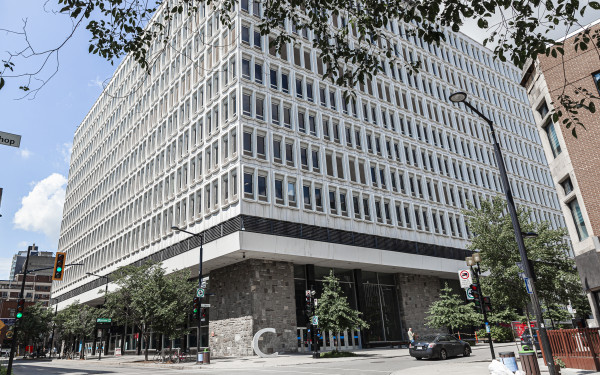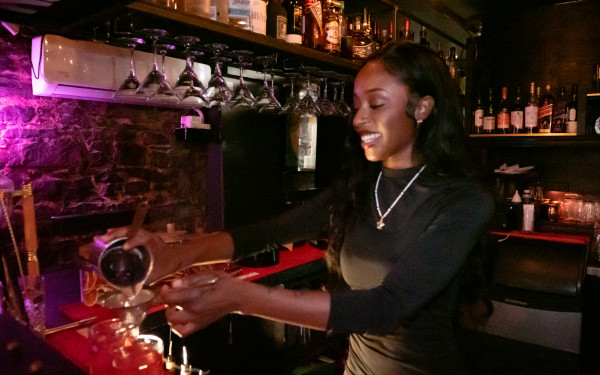Former Concordia Sexual Violence Survivor, CRARR Denounce Online Consent Training
Critics Say Training Lacks Legal Recourse Information, Policy Changes Needed
Imagine being sexually assaulted on campus twice by the same person, bounced around from service to service with no concrete results, having to drop out of school—losing your scholarships—and having to get therapy for years of trauma, only to find out your aggressor got to graduate and received a scholarship.
This happened to Cathy—whose identity is protected as a survivor of sexual assault—in 2015.
After the first assault, the Concordia student was placed under court conditions, though the university didn’t provide any other assistance to the victim.
After the second assault, the perpetrator was charged with violating his court conditions, and once again, Concordia University’s security couldn’t offer Cathy any resources other than the Office of Rights and Responsibilities, the already underfunded Sexual Assault Resource Center, and psychological counselling on campus.
Cathy took her aggressor to Concordia’s Student Tribunal, which she said did more harm than good. She was only granted a hearing in May 2016—a year after she filed complaints. The Student Tribunal refused to allow her to testify by video to avoid being in the same room as her aggressor; there was no security, and Cathy was forced to sit at the same table as her aggressor.
Cathy had a court-ordered restraining order on her abuser—who was also pleading guilty—so the conditions left her feeling unsafe.
Because of the psychological toll of the process, Cathy left the hearing and found out a few weeks later the tribunal ruled that there was no evidence to support her claim, and so it was rejected without further explanation. But, the aggressor was imposed 30 hours of community service for threatening or violent conduct.
In October 2017, Concordia was given a D- rating by Our Turn, a national action plan that evaluated the sexual violence policies of 14 universities across Canada. This was the lowest grade any school had received. Concordia’s policy was deemed to not be adequately survivor-centric—it doesn’t “prioritize the rights, needs, and wishes of the survivor,” according to their report.
This semester, Concordia introduced a mandatory online sexual violence training titled It Takes All of Us, which will be brought to universities across Quebec. This training came to be after the provincial government implemented a law requiring universities to create standalone sexual misconduct policies, Bill 151.
Cathy and the Center for Research-Action on Race Relations are coming forward, denouncing the training as flawed, saying it doesn’t go far enough to address the criminal nature of sexual violence and the university needs better policies.
They said the training “provides incomplete information on the resources for survivors and the consequences for perpetrators,” in a press release.
They also said the training, along with the SARC’s website, neglects to describe sexual violence as a violation of civil rights under the Quebec Charter of Rights and Freedoms and the training urges students to use internal resources before going to the police or using other legal recourses. They wish the Concordia Student Union’s Student Advocacy Services and Legal Information Clinic would be included in the training.
SARC coordinator Jennifer Drummond said the training will be updated every year and feedback is crucial for this, but that she hadn’t heard these complaints until an interview with The Link.
She said survivors were consulted at every stage to make sure the content was survivor-centric, but this isn’t disclosed directly in the training to protect the identities of those involved.
But, Margot Berner—who was appointed CSU representative on the sexual violence committee last semester—said the school’s consultations were far from adequate.
“It’s frustrating to say survivors were consulted when there was so much pushback from the administration to have people who were in poor academic standing on the committee when it’s very clear that survivors have a hard time pursuing their academic career when dealing with trauma,” she said.
“It’s hard to take the idea that they’re trying to consult survivors seriously. And there are already so few students on the committee. Just because there’s consultation doesn’t mean people are listened to,” she added.
This would mean someone like Cathy wouldn’t be able to sit on the consultations to develop the training.
The process of going through Concordia’s systems was incredibly taxing, Cathy said. It was much easier for her to go through the justice system as they would lay out exactly what was going to be done, then act on it. She said it felt like the university had no real system, no script, and just presented her with more obstacles every step of the way.
“A lot of the time the police do present obstacles to filing [a complaint] after the crime has taken place […] but Concordia may actually be placing itself between the law and the victim and stopping them from getting help through the legal system like victim’s compensation,” said Cathy.
“It wasn’t like ‘Oh there’s so many cases in the backlog yours will take a little longer,’ it was like ‘OK I did the thing you keep telling me to do even though it doesn’t feel right and doesn’t make me feel safe,’” she added. “At the same time I’m dealing with trauma, it’s hard for me in school, it’s hard for me to go to class or concentrate, and while I’m dealing with all this and court, I’m told ‘OK, this is the last thing,’ but there was always a new obstacle.”
The SARC assembled a sexual assault response team in conjunction with this training to avoid students being bounced around from service to service.
As each person will be affected differently—some prefer internal resources while others prefer outside legal recourses—Drummond said this response team can assess each case holistically to give survivors the best advice for them as individuals, whereas the training is meant to spread a shared language and basic knowledge about sexual violence.
“It’s a huge issue and there’s a really big culture change component to ending sexual violence so that is going to need to involve different types of education around different pieces of this topic, whether that’s the legal piece and justice system, or internal systems, or the psychological impact,” said Drummond.
Cathy said seeing this training made her feel even more alienated as her boyfriend at the time attacked her repeatedly on campus—which is a scenario the training doesn’t dive into.
“I don’t think that’s an uncommon story based on their own statistics and yet they don’t mention that sort of thing,” she said. “We know the rates of assaults and intimate partner violence. That sort of issue wasn’t covered at all […] I’m certainly not the only person who has been physically assaulted at Concordia […] this is something we can’t leave out.”
Anything that takes away the range of help available to survivors just perpetuates disempowerment and the feeling of being trapped.
—Margot Berner
Criminal Acts
CRARR’s executive director Fo Niemi was appalled the training didn’t invoke the Quebec Charter of Rights and Freedoms or the Commission of Human Rights and Freedoms.
“We don’t see a lot of emphasis on what are your rights as a victim of crime or victim of sexual harassment under the Quebec charter and what you can do and must do,” he said. “It’s not clear as to what will happen if you bring a complaint either to the police or commission of human rights or take legal action against the person who assaults you.”
He added that someone’s right to file a civil rights complaint against an institution that allows violence to happen isn’t clear in the training. And, for those who are employed by the university, they can go to the Commission des normes, de l’équité, de la santé et de la sécurité du travail if they’re subject to wrongful practices.
“If a survivor isn’t aware, they might not go any further,” he stressed. “We’re trying to empower survivors with information and the means to access justice. It’s about turning the table around and help those who are harassed or assaulted. We have to ensure the perpetrators […] are properly dealt with by the law.”
He said many aren’t aware they can seek financial compensation. For example, CRARR is currently helping a victim of sexual harrassment get compensation from the Arts and Science Federation of Associations for not protecting him from sexual harassment.
Berner said it can get tricky because “the criminal justice system is also extremely bad at dealing with cases of sexual violence so sending people to the police isn’t always ideal,” but “emphasizing this is a criminal act in our justice system and that they have this option is important.”
“Anything that takes away the range of help available to survivors just perpetuates disempowerment and the feeling of being trapped,” she said.
Niemi said the training meets the minimal requirements imposed by Bill 151 from a quantitative perspective, but from a qualitative perspective there needs to be more information from the general student community.
“They’re following the barest minimum of what Bill 151 dictates they have to do and they’re arguing every step of the way and it’s pretty grotesque,” said Berner. “We can do better.”
Many also have grievances with the click-through format of the training, saying it doesn’t allow for asking questions, among other concerns.
“If you can just arbitrarily click through, there’s really no mandatory investment,” said Cathy.
“If this won’t stop abusers from abusing, won’t make victims feel safer, and isn’t even showing an actual effort on their part to change their policies then who is it good for? It seems it’s just good for their PR,” she added.
Demands for better policy
Cathy’s friend James Vanderhaeghe supported her throughout her experiences at Concordia. He echoed Cathy’s sentiments that Concordia needs to make it clear there is a zero-tolerance policy for sexual violence at the university. He said it needs to be explicitly stated, along with descriptions of the penalties perpetrators will face.
Everyone interviewed by The Link agreed Cathy’s story doesn’t exist in a vacuum and systematic change is needed.
“I saw this click-through and nothing [in it] points to what actions Concordia is taking beyond making us aware which is not enough. It doesn’t say ‘Concordia takes this super seriously […] and if you do it, here’s what’s going to happen,’” said Cathy. “And, in my experience, it’s because nothing will happen.”
Berner said the details of what students can really do are unclear and complicated, so those willing to deal with processing these complaints don’t know where to go. She said they go through massive circuits, disclosing their trauma again and again, and “never see the results because the university withholds the results anyways.”
Cathy described her experiences with the Student Tribunal as “unsafe and humiliating,” only to learn her abuser was given 30 hours of community service while she was left high and dry.
Vanderhaeghe said the “Student Tribunal is as unprofessional as can be.” He believes a student tribunal is appropriate for cases of cheating, plagiarism, or issues of integrity but not for threats to a student’s physical safety.
Cathy said the process made her feel unwelcome at school as the administration wouldn’t acknowledge the toll it took on her.
“They made school into a hostile place,” she said.
“It feels like a behemoth, it’s impossible to take it down. What sort of horrible thing needs to happen before they change their policy?”

_900_665_90.jpg)


_600_375_s_c1.png)


